
by

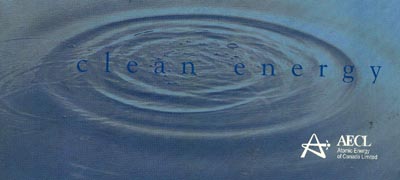
Nuclear power. It provides
electricity at competitive costs; it has a good safety record; stable fuel
prices; a secure fuel supply; it does not use a lot of land; nor does it dam or
divert rivers, flood large tracts of land, cause acid rain or contribute to
climate change, and through its medical applications it saves millions of lives
every year. So why it is so feared?
Because when something goes
wrong with nuclear energy, it can very wrong. But the reality is, that something
rarely goes wrong, especially in a properly secured facility. Still, we are left
with visions of Chernobyl and Three Mile Island dancing in our heads. Chernobyl
was, and still is, a disaster. Radiation was released from the plant because,
among other things, the Russian design didn't have a containment facility, a
standard requirement in western countries with much stronger safety features.
Three Mile Island, while ugly, did not result in any loss of life or the release
of any significant amount of radiation even though the core of the reactor was
severely damaged. Furthermore, Canada nor any other of the western nations have
ever had a loss of life associated with the use of nuclear energy for electricity generation.
A major issue, today, is how to
abate the enormous CO2 emissions - about 25 million tonnes annually worldwide.
There has been little progress in reducing fossil fuel greenhouse gas emissions
that contribute to atmospheric warming, with consequent climate change.
But as there is no combustion of
carbon involved in the generation of nuclear energy, there are no greenhouse gas
emissions. This provides an opportunity to limit potential climate change and to
meet reduction commitments.
In fact, since 1973, nuclear
energy has been the single most
important factor in reducing
worldwide carbon emissions in the electricity sector, preventing a cumulative
total of more than 22 billion tonnes of CO2 from being released into the
atmosphere.
Wind and solar energy proponents
say their energy sources are much safer than nuclear. This may be so, but there
are problems: the wind has to be blowing and the sun has to be shining. They are
both also both only designed for small-scale applications and take up lots of
land.
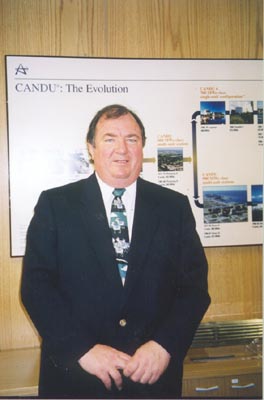
David Bock
David Bock is the Atomic Energy
of Canada Limited (AECL) representative for the Asia-Pacific region and he is
based here in Bangkok. He arrived in February, to replace Dr. Terry Thompson and
his scope of influence includes Vietnam, the Philippines and Indonesia.
Before joining AECL, Bock, a
Saskatchewan native, worked for the Saskatchewan government developing that
province's nuclear policies: "Saskatchewan is not one of the wealthiest
provinces, but we do have the world's richest uranium resources. The opportunity
was there to diversify somewhat in the nuclear fuel cycle, thereby capturing
some of the upstream benefits that now accrue elsewhere in the country,
primarily Ontario. Saskatchewan has and continues to experience problems for its
young people who seek opportunities elsewhere, primarily next door in
Alberta."
His tenure stretched from Ross
Thatcher to Allan Blakeney and then Grant Devine. During that time, he held
posts in the Finance Department, became the Chairman of the Public Service
Commission as well as the General Manager of the Liquor Board, before jumping to
the AECL as vice-president of their western region.
He has now been with AECL for
ten years mostly in the marketing/sales department, "I didn't grew up
within the company," he says. He did start out, however, by attempting to
develop a market for the smallest version of the CANDU (Canada Deuterium
Uranium) reactor, the CANDU 3. Beginning in 1992, he also began to develop some
of the AECL's Asian markets, including Thailand. At that point, he was
responsible for western Canada, the Asia-Pacific and China.
As it turned out, China moved
much faster than the others, to the point where AECL was involved in pursing a
project. Once that happened a
tremendous amount of preparation (in terms of feasibility studies and contract
negotiations) was set in place so he moved to Beijing where he lived for the
past four years before coming here.
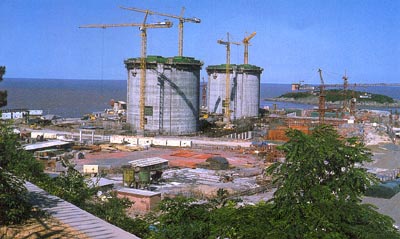 Comparing China to Thailand,
Bock says, "China is a very large country with 1.2 billion people and
someone has to make sure the people get fed and housed or they will have serious
problems. The task before the leadership of the country is tremendously
complicated as they deal with increased globalization and the baggage of a
planned, and for the most part, inefficient economy. In general terms, Thailand
is much more manageable, given its size, position within the region and natural
resources. It is richer on a per capita basis and it can afford a more open and
democratic approach to government as looking after the basic needs of its
population is not such an urgent concern.
Comparing China to Thailand,
Bock says, "China is a very large country with 1.2 billion people and
someone has to make sure the people get fed and housed or they will have serious
problems. The task before the leadership of the country is tremendously
complicated as they deal with increased globalization and the baggage of a
planned, and for the most part, inefficient economy. In general terms, Thailand
is much more manageable, given its size, position within the region and natural
resources. It is richer on a per capita basis and it can afford a more open and
democratic approach to government as looking after the basic needs of its
population is not such an urgent concern.
"Notwithstanding that, I think it's fair to say that the Chinese are stronger on the planning side having had to operate in the context of scarcity and complexity. On the other hand, Thailand, has over the years, developed a reputation as being a hospitable place to do business so it has attracted a lot more foreign investment on a per capita basis. But China is changing rapidly and there is no question that in the next twenty years it will become a major economic powerhouse."
While in China, Bock's marketing
efforts concentrated on the two CANDU 6 reactors (720 megawats each) which are
now being constructed near Shanghai. Construction started in 1997 and they will
go into service in 2003. It's a very successful proven reactor model with two
already up and operating in Canada, one in Argentina and Romania and four in
South Korea.
Commenting on his new posting,
Bock says: "These markets will take some time to develop. The agenda is
dominated by the deregulation of the electricity industry and the privitization
of utilities and that will take a number of years. I'm at the very front-end of
the marketing/sales cycle.
b"I keep track of how the
economy is doing and what the electricity demands are and I do that by talking
to government officials, people working in the utilities and possible investors.
I'm really in a market development function. I attempt to ensure that
decision-makers in the government and utilities are aware of the advantages of
nuclear power. I also work with universities, design institutes and potential
partners in putting forth a credible case for the inclusion of nuclear in their
electricity planning processes."
What about the competition? Bock
says there are not a lot of nuclear vendors in the world. He cites AECL;
Westinghouse, General Electric and ABB/CE in the USA; Framatome in France; as
well some German and Russian companies. But at the end of the day, the
competition is from all energy sources, not just other nuclear vendors.
Bock arrived in Thailand about
the time the cobalt 60 scare was sweeping the country. He says, "It should
be the role of the school system to teach people about radiation so that they
can understand its benefits and the circumstances when it can become dangerous.
But the hysteria here surrounding that event was ridiculous. The media seemed
more interested in the entertainment business than the news business."
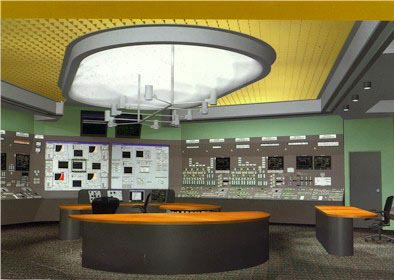 So why does nuclear power scare
so many people? "Some of it is due to ignorance but there are people who
are convinced that there is a linkage between nuclear weapons and nuclear power
reactors. And if you go back far enough in the science there is, to the extent
that's its the fundamental understanding of how these processes work.
So why does nuclear power scare
so many people? "Some of it is due to ignorance but there are people who
are convinced that there is a linkage between nuclear weapons and nuclear power
reactors. And if you go back far enough in the science there is, to the extent
that's its the fundamental understanding of how these processes work.
"In the case of a bomb, one
would be trying to unleash as much energy as possible in a very short period of
time which is the opposite of a power reactor which concentrates on controlling
the fission process to generate heat, steam and electricity for as long as
possible. It's a totally different approach to the use of the atom. But there
are people that can't seem to make that distinction or don't want to."
Benefits of nuclear energy?
"If you think global warming is a problem, then the only means of
large-scale electricity production - that doesn't create greenhouse gas - aside
from hydro, is nuclear. But in the case of hydro, you have to dam rivers and
most of the prime hydro sites are already taken.
"Hydro plants also tend to
be located far away from city centers, so you have the added inconvenience and
expense of transmission where as you can build a nuclear power plant just about
anywhere.
"In economic terms, it
avoids problems you might have with fossil fuel prices. This was the driving
force behind France's nuclear energy program as France now generates 75% of its
electricity with nuclear power because in the 70s, it decided it was not going
to be held hostage by the price of oil.
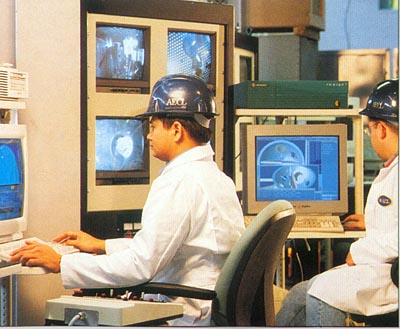 "By and large, it's
economically priced energy. It has a difficult cost structure in a deregulated
electricity market as it comes with a very high front-end capital cost and low
operating costs. Once you get past that, it provides energy at a reasonable cost
for many many years. It's the same as hydro, expensive relative to the
alternatives in the beginning but with low operating costs, whereas fossil fuels
are the other way round; the capital costs are less but the fuel costs are high
and can be unpredictable."
"By and large, it's
economically priced energy. It has a difficult cost structure in a deregulated
electricity market as it comes with a very high front-end capital cost and low
operating costs. Once you get past that, it provides energy at a reasonable cost
for many many years. It's the same as hydro, expensive relative to the
alternatives in the beginning but with low operating costs, whereas fossil fuels
are the other way round; the capital costs are less but the fuel costs are high
and can be unpredictable."
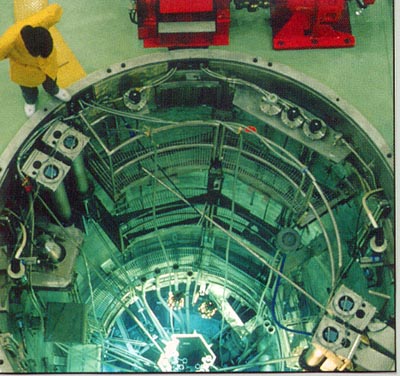
Any history of problems at
Canadian nuclear plants? "We had a rupture of a pressure tube in Pickering
in the early 1980s. That was dealt with by the reactor control and safety
systems and there was no other damage to expensive equipment nor was there any
danger to the public. In fact, the event led to the development of stronger
pressure tubes through advances in the metallurgy which now means that the
reactors have a longer economic life as well."
***********
In 1994, Canada and Thailand
developed a program to exchange information and technical training on nuclear
power and related subjects. The project, called the Thai-Canada Human Resource
Development Program, has been supported by CIDA, several Canadian universities
and Atomic Energy of Canada Limited.
In Thailand, the program has
been supported by the Government of Thailand, EGAT and Chulalongkorn University.
To date, more than 35 courses have been provided by visiting Canadian experts.
Several Thai exchange and work placements in Canada have also taken place.
*********
Contact Info:
Tel: (662) 636-2305-16
Fax: (662) 636-2307
E-Mail: bockd@aecl.ca
*********

Finis